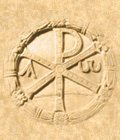           |


Oportet veritatem esse ultimum finem
totius universi (ScG 1.1)
The Pontifical Academy of St. Thomas Aquinas was established on 15 October 1879 by Leo XIII, who approved its statutes with his 'Breve' of 9 May 1895. The Academy was then confirmed by St. Pius X with his apostolic letter of 23 January 1904 and enlarged by Benedict XV on 31 December 1914. John Paul II then reformed the Academy on 28 January 1999 by his apostolic letter Inter Munera Academiarum, issued shortly after the encyclical Fides et Ratio. The Pontifical Academy of St. Thomas Aquinas carries out a specific mission, which is to carry out research into, to defend, and to disseminate the doctrine of the Angelic Doctor, and, taking due account of contemporary cultural traditions, 'to develop further this part of Thomistic doctrine which deals with humanity, given that his assertions on the dignity of the human person and the use of his reason, in perfect harmony with the faith, make St. Thomas a teacher for our time' (Inter Munera Academiarum, n. 4). In this apostolic letter John Paul II invites us to refer to the encyclical Aeterni Patris in which Leo XIII, reproposing the doctrine of Vatican Council I, emphasised the urgent need to show 'how philosophical thinking contributes in fundamental ways to faith and theological learning' (Fides et Ratio, n. 57). The Pope gathers the fruits of the large-scale movement, which, from the nineteenth century to the threshold of the third millennium, led philosophers to deepen metaphysical research into the ultimate questions regarding man and the mystery of the human person himself. Then, taking into account the importance of the human sciences, their contribution to knowledge regarding man, and the new questions generated by scientific research, directed towards a deeper knowledge concerning the mystery of man, the Pontiff invites the Academicians to follow the indications on the subject proposed by Vatican Council II, as well as the guidelines that he himself has constantly proposed to the Church, ever since his first encyclical whose beginning Redemptor Hominis made clear the chief direction of his pontificate. In the words of the Holy Father, Benedict XVI, in his address for the feast of St Thomas:
The relationship between faith and reason is a serious challenge to the currently dominant culture in the Western world, and for this very reason our beloved John Paul II decided to dedicate an Encyclical to it, entitled, precisely, Fides et Ratio, Faith and Reason. Recently, I too returned to this topic in my Discourse to the University of Regensburg. (...) St Thomas Aquinas, with farsighted wisdom, succeeded in establishing a fruitful confrontation with the Arab and Hebrew thought of his time, to the point that he was considered an ever up-to-date teacher of dialogue with other cultures and religions. He knew how to present that wonderful Christian synthesis of reason and faith which today too, for the Western civilization, is a precious patrimony to draw from for an effective dialogue with the great cultural and religious traditions of the East and South of the world (Angelus, St Peter's Square, Sunday, 28 January 2007).
THE PONTIFICAL ACADEMY OF ST THOMAS AQUINAS
Casina Pio IV
V-00120 VATICAN CITY
TEL. +39 0669883195 - FAX +39 0669885218
E-MAIL: past@past.va
|







